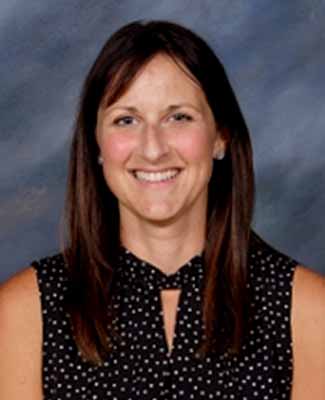Andrea Junker
Harrisburg South Middle School

What does the typical day of a middle school counselor look like?
It looks different every day.
It’s a lot of connecting with teachers, parents, kids, school administration. I also connect with professionals outside of the school: outside counselors who come in to work with kids, the Department of Social Services, sometimes law enforcement, and a lot of other people.
Mostly what I do involves working with teens to problem solve – emotionally, behaviorally, and academically. I run our I-team process, we meet with the parents, students, and teachers to figure out how to make the kid successful.
What is the role of a counselor in a typical student’s education?
For any kid, it’s about helping to make sure they’re getting social supports and career exploration opportunities to help expose them to different opportunities post high school, what they’re interested in and what they’re good at.
We start to focus little bit by little bit – we help them understand the choices they make, and where that can bring them.
We’re very blessed in Harrisburg, where kids can specialize in high school – culinary classes, CTE classes, automotive, AP classes. They can start figuring out what they like, and it doesn’t cost them anything. I’m very lucky at the middle school level, to do individual counseling.
You’re a counselor at a middle school. What are the unique needs of middle schoolers that you’d see less of in high school or elementary school?
I’ve never worked in high school, so I can’t speak to that.
There’s a big shift in the needs for mental health at this age from elementary to middle school.
There’s a lot of anxiety; a lot of what I do is helping kids to navigate social situations, supporting conflict management and appropriate communication. So many friendship issues are linked to ineffective communication; I talk to them about what a friend looks like. Relationships with their peers change, so sometimes it’s how to go from friend to classmate.
What can you tell me about the typical middle school perspective or experience that most adults may not understand?
I don’t think adults understand the level of stress that kids are carrying, and how hard it is to be this age. A big part of it is that the things they’re dealing with may not seem like much to an adult, but it’s a big deal to them. It’s important to step outside of your adult self and feel and understand what they’re going through. They connect so much through their peers and social media.
One issue is that the level of comparison is constantly there – it’s on social media, and it’s so unrealistic. Kids are getting information from such awful sources.
I think it helps to have parents understand that it’s also a hard place to be as a parent – when kids feel things at this age, they really feel it.
We did a parent night – Help! I’m a Middle School Parent! We brought in a bunch of different speakers to talk about the tools available: the help line (988), how kids can use that. We had outside counselors talk about their role, Sanford Wellness was there to talk to parents of athletes.
We had some other presentations that were linked around apps and phone usage and social media. We discussed vaping and other things that parents might not be familiar with. We tried to cover all the things that were beneficial for parents to hear and allowed them to ask questions. It’s hard for parents to try to keep up with all of the new things their kids might be interacting with, and that night was a way to begin to talk about it, to bring awareness to that.
What’s the most rewarding part of being a school counselor?
When a kid feels safe enough to share something that is huge – a heavy burden – with someone who loves and cares for them.
What’s the most challenging part of being a school counselor?
I think as kids get older, helping them understand how to keep their voice and choice in situations where they don’t have it. I have an obligation to keep parents informed about serious situations. When a student is struggling with something, and a parent is not receptive to that – that’s hard.
Balancing a parent’s right to know what’s going on in their kids’ life, with making sure the kid is able to keep their voice and understand the choices they have available to them is hard but really important.
What traits in a person make a good school counselor?
You have to be genuine – kids can tell that right away when you aren’t being genuine or real.
You have to be able to connect with kids – to have that drive and willingness to be silly, goofy, willing to put yourself out there.
You have to be very flexible. We wear a lot of different hats. You have to be up for change. It’s a very fast paced environment.
Kids have to trust you. There has to be a big sense that they can trust you. Being open and honest when you can is important as well.
Do you have anything to add?
I think I’m so blessed that I get to wake up every day and do this [work]. It doesn’t feel like a job. I love that I get to connect with kids, to be the person who loves them and sees them, and will be there for them no matter what.
